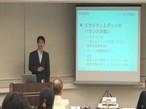Startup phase: Scalability Switch
Hello. This is Irino, a strategy consultant.
I’ll explain about startup tactics.
Table of Contents in Business Plan
|
Some people spend much cost and time to create perfect products from the very beginning. They often find their product is over-spec and off the point from customer’s viewpoint. Make a prototype. Prototype should not be perfect. It should be shabby but focusing on core value. It includes prototype of business process from sales to payment.
In many plans, no income is supposed for the first months. At start-up phase, you should be making efforts to get the first customer as soon as possible so you can make profits even if it’s only 1 yen. Why I emphasize “the first customer” is because it is very hard for venture companies to find that one customer. No matter how great your product or service may be, customers usually will not buy from you if you don’t have a past record of selling at all.
Also, making profits of 1 yen and none at all is really different. Even when you give out free trial samples and get good responses during the marketing investigation period, it doesn’t mean people will actually pay money for them once they are actually on sale. If customers are willing to pay even 1 yen, then it indicates there are market needs for your products and you do have a business opportunity no matter how small it may be.
Also, the fact this 1 yen comes not from banks or investors, but from customers means a lot. 1 yen from customers and 1 yen from investors have a completely different value. When you consider the price impact on the current share price, “1 yen from investors” is just 1 yen, but “1 yen from customers” has a value of more than 2.1 yen (Corporate value ≒ 7 times EBITDA & The gross profit = 30%).
So once again, it’s important to get “the first 1 yen from customers” as soon as possible during start-up phase.
“At the first stage of start-up phase, we will sell at major convenience store channels”
“At the first stage of start-up phase, we will appeal to female office workers in their twenties…”
“When we launch our web site, we are going to hire people who have PHP skills and design capabilities…”
I am talking about cases like above. It is not good enough if you can’t write specific names of companies and people, because it is often hard for venture companies to find collaborative companies or getting talented people to work for them at start-up phase. People will assume the fact that you can’t specify proper nouns means your start-up strategies are still immature.
A better description for start-up phase is…
“I negotiated with Mr. Tanaka who is a purchasing manager for a local supermarket named Super Takeda whom I’ve know for the last 15 years from my former company. He has agreed to put our products at 5 stores in Saitama’s southern area for a limited time and …”
“I asked 50 ex-members of the basketball club from my college to buy….”
“I hired Mr.Kamamoto whom I’ve worked together in a project for 2 years before…”
It might not be easy to find best customers or partners from the very beginning, but you still want to be as specific and realistic as possible when you build your business.
During start-up phase, you will not always get to take the shortest straight path to the final destination. However, This section is about what you will do right away when you actually start your business, so you do need to have “proper nouns” ready.
There are 3 finance related charts that are often made for business plans; PL, BS, CF. However, the only valid one in reality is your monthly PL. You don’t need to prepare monthly BS unless you are a manufacturer which requires a large scale investment of assets. Also, monthly CF is insufficient. Please think of a case in which 3 million yen is paid as salaries on the 25th and accounts receivable-trade of 7 million is deposited at the end of the month on the 30th. When you look at your monthly CF, it seems like you have a surplus of 4 million yen, but there are times when you can’t pay salaries on the 25th. So, there is a need to grasp your current condition of funds daily and not monthly. Raising funds for venture companies at start-up phase is far more unstable than most managers anticipate, so a better way is to manage fund-raising using a daily trial balance sheet.
During start-up phase, companies often distress over how to present themselves.
- Is it better to make a joint-stock company or shall it be LLP?
- How much capital is necessary to win trust from people as a company?
- Is is necessary to notify a social insurance office?
- What do you need to submit to the tax office?
- Which ward will look good as a place to have your office?
- Which is a better accounting software to use, Yayoi Kaikei or Kanjyo Bugyou?
- How should you go about enter accounting assortment?
To tell you the truth, these are not important at all. You don’t want to be wasting your precious time during start-up phase on considering such trivial things. Venture companies don’t have enough credence anyway whether you make it a joint-stock company or LLP and have a capital of 10 million or 50 million yen. The only certain way of gaining trust as a venture company is to satisfy customers and gain profits. What you need in the beginning is not the right way of presenting yourself, but customers. Experienced entrepreneurs don’t care so much about presentation, but devote 80% of their time on marketing their products and services to customers instead. For example,
- they start appealing and selling to customers even before organizing registration of their companies.
- their offices are lodgings/at home/rental office.
- they will take care of accounting assortment only every 6 months or so and make use of batch processing or outsourcing.
When you have a business project, it is better to make small profits. However, it can be also hard for such project to grow big. There is a big dilemma between starting small and doing big business. Yet, there is a condition that could solve this dilemma. It is scalability (expandability of business projects).
Experienced entrepreneurs select business projects that can be started small, but have potential of become big businesses. Then, they think of ways to maximize scalability after their businesses are launched. No matter what the business is, sales volume and profits increase in steady addition like
Sales volume = 1 customer + 1 customer + 1 customer…
However, there will come a point in which sales volume and profits will increase as in multiplication. For example, if you build a system in which you have many distribution agents or franchise stores, then
Sales volume = 1 customer + 1 customer + 1 customer
+ 3 distribution agents × 3 customers
+ 6 franchise stores × 10 customers
Like in the manner I just presented, I refer to triggers and set ups which could rapidly expand your business as “scalability switch”. Experienced entrepreneurs always keep Small Start in mind, yet try to come up with scalability switch that could eventually lead to Big Business.

Recently, VC companies are investing to either environmental technology or medical industries and not much money is being invested to IT related enterprises and the industry is experienceing a major downturn. The reason why this is happening seems to be because not much new innovation can be expected or the sales volume of IT industry as a whole is not reaching multibillion-yen, therefore can’t really call it a big business. However, when you take scalability into consideration, IT still is certainly an industry in which you can start small and increase the number of customers at an explosive pace. I feel IT domain that produce application services for Google cell-phones(Android) and iPhone still have much possibility. This domain grows a lot quicker in the world market than in the Japanese market, so it’s mandatory that you internationalize your executive team or engineers.
Irino
My column on how to write business plan documents and their formats will be posted in Nikkei BP and BigOcean in February, so I would be grateful if you could have a look at them.
That’s it for today.
- A celebrity entrepreneur
- A managing director in a listed company
- A professor
- A rocket scientist
Looking forward to working with excellent leaders.
Please contact:
iphone: 090-6497-4240
irino@linzylinzy.com (Irino)
- One-two finish in the largest business plan contest in Japan
- One-two finish in Asian Entrepreneurship Award
- No.1 in google "business plan"
- Judge in the Cloud-Computing Awards
- Write/Review +100 business plans a year
- Meet +300 entrepreneurs a year
- Large-scale project management
e.g. +15,000 man-months post merger integration - Expertise: business planning, financing, IT, project management
- Fortune Global 500 companies:
bank, brokerage, card, SIer, etc - Startups:
IT, cloud, bio, cosmetics, minor metals, aerospace, etc - Tokyo University -> University of British Columbia -> Oracle -> Headstrong -> Independent



